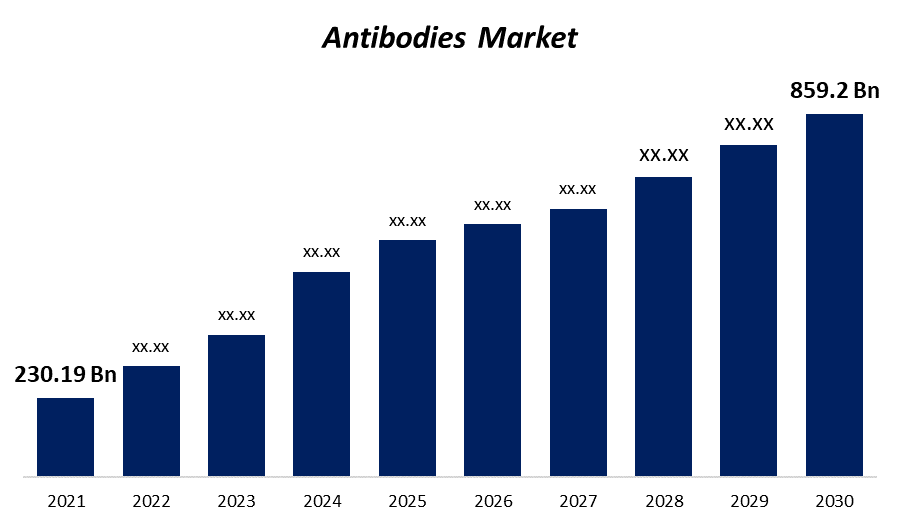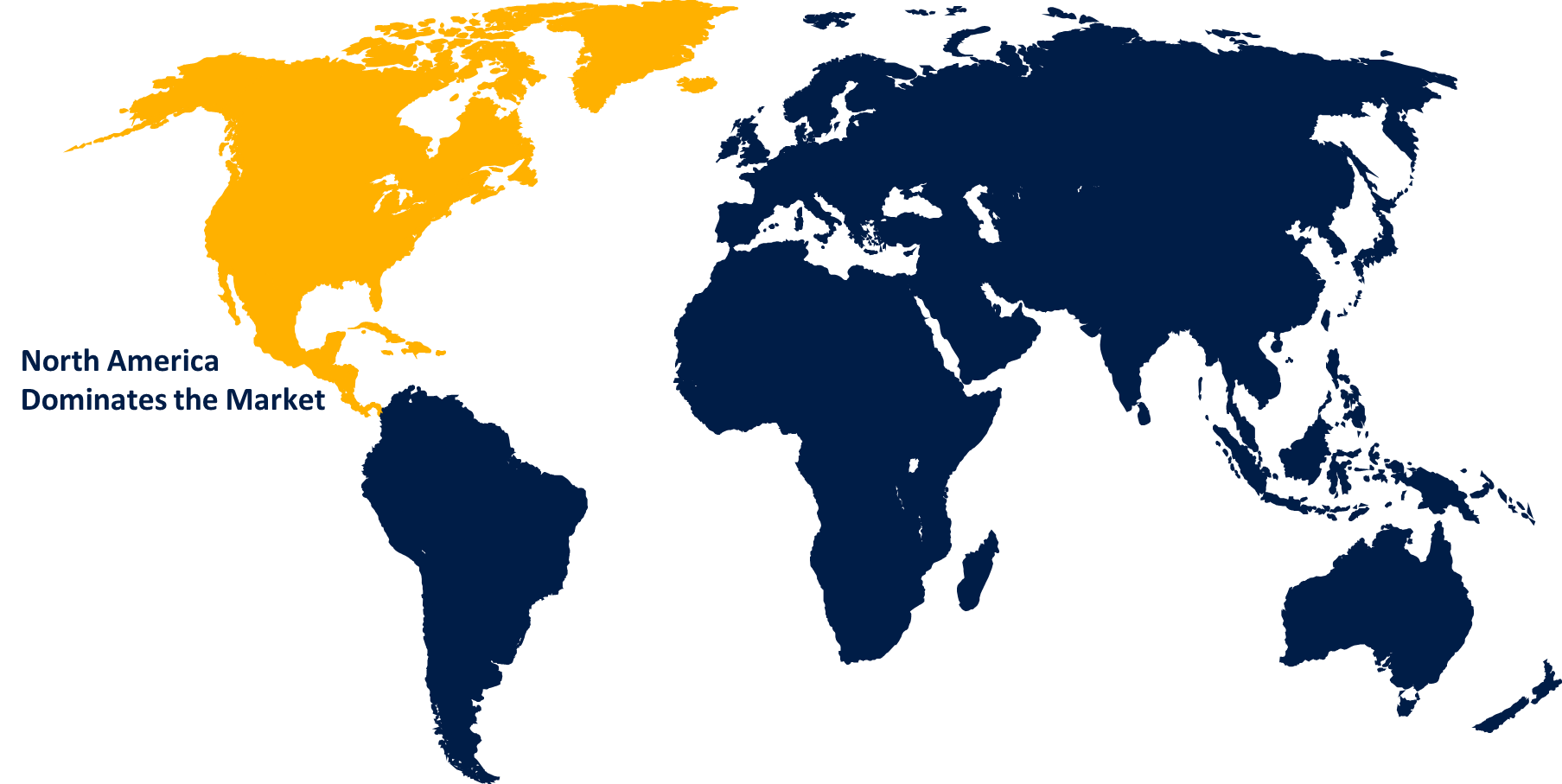Global Antibodies Market Size, Share, and COVID-19 Impact Analysis, By Type (Monoclonal Antibodies [mAbs] {Oncology, Autoimmune Diseases, Infectious Diseases}, and Antibody-drug Conjugates [ADCs]), By End-user (Hospitals, and Specialty Centers), and By Region (North America, Europe, Asia-Pacific, Latin America, Middle East, and Africa), Analysis and Forecast 2021 - 2030.
Industry: HealthcareGlobal Antibodies Market Insights Forecasts to 2030
- The Global Antibodies Market Size was valued at US$ 230.19 Billion in 2021.
- The Market is growing at a CAGR of 12.93% from 2022 to 2030
- The Worldwide Antibodies Market Size is expected to reach US$ 859.2 Billion by 2030
- The Asia Pacific is expected to grow the fastest during the forecast period

Get more details on this report -
The Global Antibodies Market Size is expected to reach US$ 859.2 Billion by 2030, at a CAGR of 12.93% during the forecast period 2022 to 2030. The antibody market has grown due to increasing demand for therapeutic antibodies. In addition, several pharmaceutical companies are focusing on manufacturing and developing advanced antibodies for treating diseases like arthritis, cancer, etc.
Market Overview
A protein termed an antibody, also known as immunoglobulin, is created by plasma cells in response to particular antigens. These antibodies have the potential to treat a variety of conditions, including malignancies, autoimmune disorders, inflammatory & infectious diseases, and others, in addition to serving diagnostic functions. The fields of oncology, neurology, autoimmunology, and cardiology all use therapeutic monoclonal antibodies extensively. The global market for antibodies is anticipated to develop as chronic disease prevalence rises. For instance, the World Health Organization reports that 9.6 million fatalities and 18.1 million new cases of cancer were reported globally in 2018. Cancer, autoimmune illnesses, and many types of neurological problems can all be treated with antibodies. According to the National Stem Cell Foundation (NSCF), autoimmune illnesses impact around 4% of the world's population. Diabetes, MS, Crohn's disease, and rheumatoid arthritis are the most prevalent autoimmune illnesses. The demand for antibodies is expected to surge in the coming years as autoimmune illnesses are becoming more common. The prevalence of cancer is growing, and its high death rate has increased the need for efficient, focused treatments like antibody therapy. Targeting tumor antigens and boosting immune cells' anti-tumor capacities are two recent technological advances in antibody-based therapies. The market for antibody therapy is also anticipated to rise as a result of rapid technological advancement and product development in the field of cancer treatment. A concentrated or monoclonal antibody is used in antibody therapy, a targeted therapeutic intervention, to treat conditions like cancer, infectious disorders, autoimmune diseases, and others. The antibodies target a particular antigen that either activates or inhibits a series of biological reactions, such as stopping the spread of cancer or activating the immune system, among many other biological responses.
Global Antibodies Market Report Coverage
| Report Coverage | Details |
|---|---|
| Base Year: | 2021 |
| Market Size in 2021: | USD 230.19 Billion |
| Forecast Period: | 2022-2030 |
| Forecast Period CAGR 2022-2030 : | 12.93% |
| 2030 Value Projection: | USD 859.2 Billion |
| Historical Data for: | 2019-2020 |
| No. of Pages: | 258 |
| Tables, Charts & Figures: | 100 |
| Segments covered: | By Product Type, By End-User |
| Companies covered:: | Abcam Plc., Merck KGaA, Thermo Fisher Scientific, Inc., Cell Signalling Technology, Inc., Santa Cruz Biotechnology Inc., PerkinElmer, Inc., Becton, Dickinson and Company, Bio-Techne Corporation, Proteintech Group, Inc., and Jackson ImmunoResearch Inc. |
| Growth Drivers: | Increase demand in therapeutic antibodies is expected to drives the markets growth over the forecast period. |
| Pitfalls & Challenges: | Covid-19 Impact Analysis |
Get more details on this report -
Report Coverage
This research report categorizes the market for global antibodies based on various segments and regions, forecasts revenue growth, and analyzes trends in each submarket. The report analyses the key growth drivers, opportunities, and challenges influencing the global antibody market. Recent market developments and competitive strategies such as expansion, product launch and development, partnership, merger, and acquisition have been included to draw the competitive landscape in the market. The report strategically identifies and profiles the key market players and analyses their core competencies in each global antibody market sub-segments.
Segmentation Analysis
- In 2021, the monoclonal antibodies [mAbs] {oncology, autoimmune diseases, infectious diseases} segment dominated the market with the largest market share of 65% and market revenue of 2.9 million.
Based on the type, the global antibodies market is categorized into Monoclonal Antibodies [mAbs] {Oncology, Autoimmune Diseases, Infectious Diseases}, and Antibody-drug Conjugates [ADCs]. In 2021, the monoclonal antibodies [mAbs] {oncology, autoimmune diseases, infectious diseases} segment dominated the market with the largest market share of 65% and market revenue of 2.9 million. In oncology, neurology, autoimmunology, and cardiology, monoclonal antibodies are widely used. The global market for antibodies is anticipated to develop as chronic disease prevalence rises. Additionally, the advent of affordable biosimilar antibody therapies is anticipated to support market expansion. For instance, trastuzumab, a monoclonal antibody used to treat early-stage breast cancer, was prequalified by the World Health Organization (WHO) in December 2019. Trastuzumab typically costs $20,000 USD. Trastuzumab biosimilars, on the other hand, are typically 65% less expensive than the original.
- In 2021, the hospitals segment accounted for the largest share of the market, with 60% and a market revenue of 2.7 million.
Based on the end-user, the antibodies market is categorized into Hospitals and Specialty Centers. In 2021, the hospitals segment accounted for the largest share of the market, with 60% and a market revenue of 2.7 million. As hospitals treat a wide range of illnesses and injuries, they typically have an emergency room or trauma center to manage life-threatening situations.
Regional Segment Analysis of the Antibodies Market
- North America (U.S., Canada, Mexico)
- Europe (Germany, France, the U.K., Italy, Spain, Rest of Europe)
- Asia-Pacific (China, Japan, India, Rest of APAC)
- South America (Brazil and the Rest of South America)
- The Middle East and Africa (UAE, South Africa, Rest of MEA)

Get more details on this report -
North America emerged as the largest market for the global Antibodies market, with a market share of around 39% and 4.5 million of the market revenue in 2021.
- In 2021, North America emerged as the largest market for the global antibodies market, with a market share of around 39% and 4.5 million of the market revenue. North America is expected to be the largest market. Due to key players' increasing investments in the development of new antibody therapies. In addition, because of the high demand for targeted medications in the region, more clinical trials have been conducted, which has helped the market as a whole. Additionally, the region's advanced healthcare infrastructure and high healthcare spending are anticipated to boost regional market expansion. The market has a profitable possibility because of the increased prevalence of cancer in North America. In the United States, there were roughly 1.8 million cancer cases identified in 2020, and there were also about 606,520 fatalities. According to the National Cancer Institute, there are 442.4 new cases of cancer diagnosed for every 100,000 people, and 158.3 cancer deaths occur for every 100,000 people.
- The Asia-Pacific market is expected to grow at the fastest CAGR between 2021 and 2030, due to the growing geriatric population and ailments linked to them will fuel market expansion in the years to come. In addition, due to rising government spending on drug development and rising public awareness of conditions including rheumatoid arthritis, cancer, and infections, the discovery, and production of antibodies in China are anticipated to rapidly expand. In March 2018, China created its first antibody recognized by the American Food and Drug Administration (FDA). The "Trogarzo" antibody was effective in treating HIV infections with resistance.
Competitive Landscape
The report offers the appropriate analysis of the key organizations/companies involved within the global antibodies market along with a comparative evaluation primarily based on their product offering, business overviews, geographic presence, enterprise strategies, segment market share, and SWOT analysis. The report also provides an elaborative analysis focusing on the companies' current news and developments, including product development, innovations, joint ventures, partnerships, mergers & acquisitions, strategic alliances, and others. This allows for the evaluation of the overall competition within the market.
List of Key Market Players:
- Abcam Plc.
- Merck KGaA
- Thermo Fisher Scientific, Inc.
- Cell Signalling Technology, Inc.
- Santa Cruz Biotechnology Inc.
- PerkinElmer, Inc.
- Becton, Dickinson and Company
- Bio-Techne Corporation
- Proteintech Group, Inc.
- Jackson Immuno Research Inc.
Key Target Audience
- Market Players
- Investors
- End-users
- Government Authorities
- Consulting And Research Firm
- Venture capitalists
- Third-party knowledge providers
- Value-Added Resellers (VARs)
Some of the Key Developments:
- In February 2021, Abingdon Health and Abcam began working together to investigate possibilities for expanding their service and product offerings, which now include Abcam's reagent range and Abingdon Health's quick test contract development and manufacturing services.
- In September 2020, For effective clinical trials of their monoclonal antibody treatment (REGN-COV2) for COVID-19, Regeneron and Roche partnered.
Market Segment
This study forecasts global, regional, and country revenue from 2019 to 2030. Spherical Insights has segmented the global antibodies market based on the below-mentioned segments:
Global Antibodies Market, By Type
- Monoclonal Antibodies [mAbs] {Oncology, Autoimmune Diseases, Infectious Diseases},
- Antibody-drug Conjugates [ADCs]
Global Antibodies Market, By End-User
- Hospitals
- Specialty Centers
Global Antibodies Market, Regional Analysis
- North America
- US
- Canada
- Mexico
- Europe
- Germany
- Uk
- France
- Italy
- Spain
- Russia
- Rest of Europe
- Asia Pacific
- China
- Japan
- India
- South Korea
- Australia
- Rest of Asia Pacific
- South America
- Brazil
- Argentina
- Rest of South America
- Middle East & Africa
- UAE
- Saudi Arabia
- Qatar
- South Africa
- Rest of Middle East & Africa
- Drivers- Increase demand in therapeutic antibodies
- Restraint- Inadequate results
- Opportunities- Rise in Healthcare expenditure
- Challenges- High Cost
Frequently Asked Questions (FAQ)
-
What is the market size of the Antibody market?As per Spherical Insights, the size of the Antibody market was valued at USD 4.5 million in 2022 to USD 7.6 million by 2030.
-
What is the market growth rate of the Antibody market?The Antibody market is growing at a CAGR of 6% from 2022 to 2030.
-
Which country dominates the Antibody market?North America emerged as the largest market for Antibody.
-
Who are the key players in the Antibody market?Key players in the Antibody market are Abcam Plc., Merck KGaA, Thermo Fisher Scientific, Inc., Cell Signalling Technology, Inc., Santa Cruz Biotechnology Inc., PerkinElmer, Inc., Becton, Dickinson and Company, Bio-Techne Corporation, Proteintech Group, Inc., and Jackson ImmunoResearch Inc.
-
Which factor drives the growth of the Antibody market?Increase demand in therapeutic antibodies is expected to drives the market's growth over the forecast period.
Need help to buy this report?